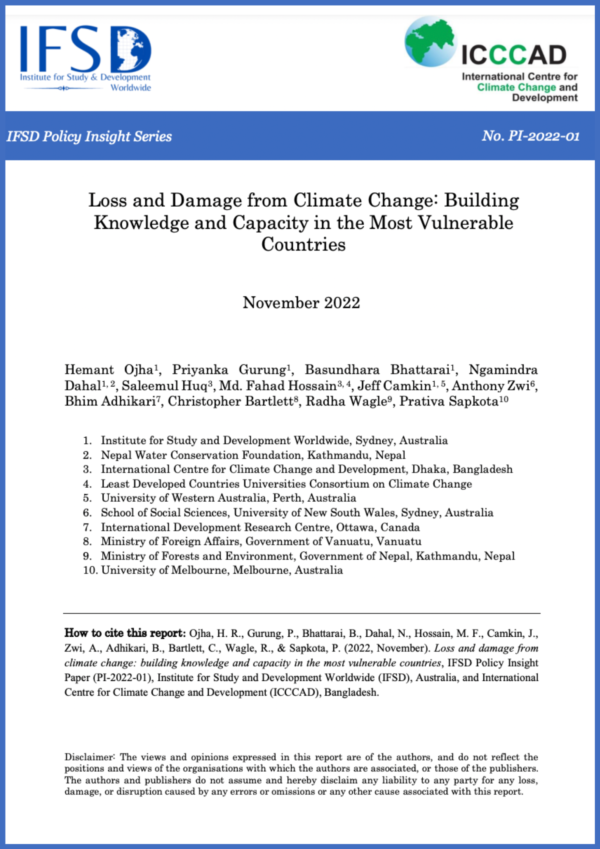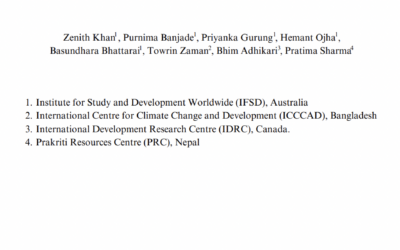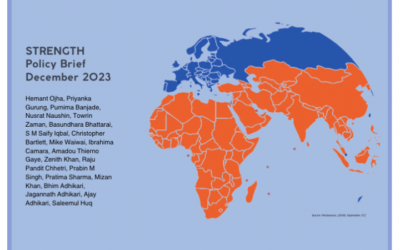Communities around the world are suffer significant losses and damages from unprecedented extreme climate-induced disasters. This Policy Insight, prepared by the Institute For Study and Development (IFSD) in collaboration with the International Centre for Climate Change and Development (ICCCAD), brings some of the most pressing questions on Loss and Damage (L&D) into the limelight. How long do vulnerable countries have to suffer the consequences of climate change impacts caused by others? When will the climate vulnerable groups see Loss and Damage support becoming active, overcoming inaction bred by excuses and alleged misunderstandings? And what are some of the principles on which L&D should be addressed ?
The need for proper funding mechanisms to deliver much needed finances to address climate change have for long been a vital topic in the global climate policy debate. However, lack of specific data and research capacity mainly in developing countries has turned into a major impediment to formulating relevant L&D policies at the national level—thereby diminishing their position at global climate negotiations. This ambiguity has also caused delay in taking meaningful climate action.
Within the United Nations Framework Convention on Climate Change (UNFCCC), L&D has become extremely complicated and contentious due to confusion regarding fundamental financing strategies as well. Despite the fact that the idea of L&D as a policy response has received more attention in recent years, there is currently no well-defined and widely accepted definition, which has led to ongoing disagreements among UNFCCC Parties. There is not yet even a basic level of agreement on how L&D should be understood, assessed, and implemented, which has led to an increase in disagreements between developed and vulnerable nations. The context-specific nature of L&D and the difficulty in translating it into a single operational unit has made it even more challenging to progress further on L&D.
With this Policy Insight, it is clear that the countries facing the consequences of the climate crisis are the ones least responsible for it, and yet the global policy response to L&D has been less than promising. In terms of addressing L&D in vulnerable nations, the mechanisms have largely consisted of nominal cooperation from developed countries.
Three case studies of Vanuatu, Bangladesh and Nepal illustrate wider; their current L&D policy response and the priority actions that need to be executed.
The most pivotal point that the Vanuatu case highlights is that there is a need for more clarity regarding international legal obligations and legal remedies as a result of climate-induced loss and damage. Although not necessarily based on the principle of liability or compensation, international support for Vanuatu’s engagement on loss and damage is growing. Even when Vanuatu’s integrated approach to climate change adaptation and disaster risk reduction is a significant step forward within the country, institutional capacity must be strengthened immediately to ensure that resources, assistance, and policies are effectively implemented.
Similarly, the case on Bangladesh furthers the dialogue on the numerous obstacles and gaps regarding L&D. As ministries involved in working on adaptation and disaster risk reduction (DRR) carry out activities in silos, significant overlaps are found. Due to the absence of a system for proper data collection and management, debilitating data gaps persist. Diverse capabilities to address various forms of L&D at various levels remain inadequate. However, it is essential to acknowledge the efforts made nationally to address and minimize losses and damages despite the completely inadequate resources available domestically.
Despite the launch of the National Framework on Climate Change Induced Loss and Damage, Nepal’s institutional architecture has yet to properly contextualize L&D in the national context. Many efforts are yet to be made to strengthen this framework to better formulate effective L&D responses.
This Policy Insight, therefore, is a must read not just because it explicates the urgency of expediting work on Loss and Damage, but more importantly because it offers grounded and forward looking insights that could inspire actions even when there are differences and ambiguities. Integrative L&D response systems are needed because risk governance systems are scattered across various sectors. Developing nations require assistance in developing their capacity to comprehend, translate, and incorporate L&D action into their existing climate and development governance systems; the gravity of this situation is more than palpable as we go through this Policy Insight paper.
Main document can be found here




